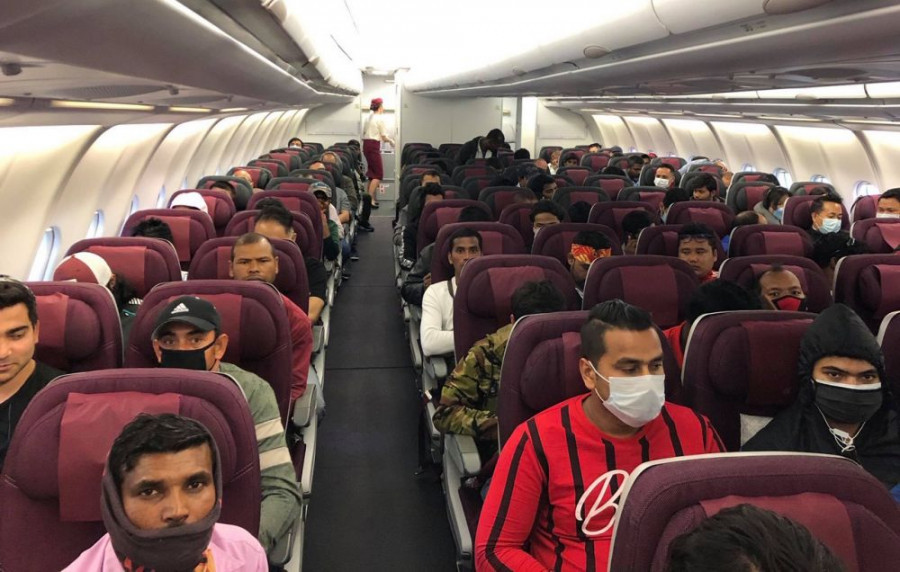Editorial
Relief for the returnees
There should be no delay in the disbursement of financial relief to migrant workers.
The pandemic continues to disrupt our lives, more so for migrant workers and their families who took a direct hit as the world enforced stringent measures, including the closure of borders to contain the spread of the coronavirus. In March 2020, when the Oli administration enforced a nationwide lockdown with little planning or preparedness to deal with a public health emergency of this scale, migrant workers in the destination countries were left to fend for themselves, with little or no support from our diplomatic missions there.
Migrant workers have long been exploited and duped by brokers, manpower agencies and recruiters in the destination countries. They have often found themselves living and working in slavelike conditions with little attention and support from the government. The economic crisis that followed the spread of Covid-19 across the world just aggravated their situation. Jobs disappeared overnight, workers were broke and even dwelled on the streets, and had no means to return home. While workers who still had their jobs continued to work, most of them were slaving for reduced wages or no salaries at all. Countless stories of their miseries over the past nine months continue to be ignored and sidelined while the unfolding crisis affects workers and their families disproportionately.
As the government continues to repatriate migrant workers, there is scant assessment of how the crisis has impacted them and their families or how it will unfold in 2021. There is no roadmap to follow through on the ambitious commitments and tall claims made repeatedly to reintegrate migrant workers and create jobs. There is a failure to understand that ignoring these issues upfront will only bring severe implications to the country and communities affected the most. The government, which has long been scrambling to develop effective economic recovery plans amid sluggish circumstances, continues to neglect the migrants who bear the brunt of an uncertain future.
Time is an invaluable resource as much as it is irreversible. It is unclear how the next several months will unfold for migrant workers deep in debt and whose only source of livelihood has evaporated. But there are no indications of timely interventions to fix this worrying situation as their financial situation deteriorates. There are already reports that returnees struggle to purchase daily food and face difficulties to pay back their loans with high interest. A delay to rapidly access and intervene in this crisis could make it harder to cope and push people further into poverty, and with it, produce an entire set of problems that could kill all progress the country has made so far. There is an urgent need to create livelihood opportunities for the returnees by utilising their skill and ensuring that their rights, benefits and any compensations they are entitled to by law are honoured.
The government must develop sustainable programmes and initiatives and mobilise resources to implement a support system that ensures economic opportunities for workers who have returned with skills and experiences. It’s not going to be easy to create jobs amid an unfolding crisis, but the government must also take this as an opportunity to right the wrongs, which have made the country vulnerable in the first place.
The government must start with clear intentions and take stock of the developing situation while parallelly use its diplomatic channels to negotiate rightful compensation from the labour destination countries. It must also maintain robust documentation of the returnees and exercise existing legal provisions to utilise the Foreign Employment Welfare Fund, which can be spent on welfare projects and compensation to assist workers and their families in these tumbling times. The fund was envisioned for situations as we have right now, and it is the workers themselves who contributed to it. There should be no delay in the disbursement of financial relief to migrant workers when they need it the most.




 27.41°C Kathmandu
27.41°C Kathmandu














